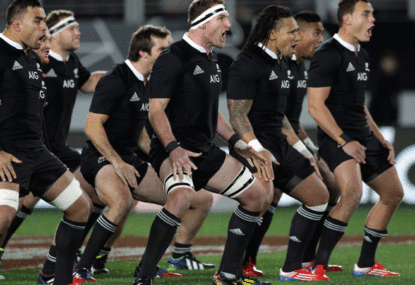The psychological boost which comes with the installation of a new coach is well and truly in play leading into Saturday night’s Bledisloe Cup Test in Sydney.
Most human beings are invariably optimistic – we want things to be better and we find ways to fulfill that want, often by letting the heart rule the head.
What other explanation is there for almost all Australian rugby experts in press and on TV tipping the Brumbies to defeat the Chiefs and win the 2013 Super Rugby title, away from home, after travelling from South Africa in the lead up?
Or Australian cricket followers believing the appointment of Darren Lehmann over Mickey Arthur was enough to ensure an Ashes series victory – despite him drawing from the same pool of largely deficient players and having no meaningful time in which to have any real influence?
Two constants stand out over the last ten years of All Black dominance of the Bledisloe Cup.
The first is the unerring ability of the Australian rugby media and supporters to approach each series with renewed confidence, to put forward reasons why this season will be different than the last and, for many, to tip Australia to win.
The second is the consistent failure of the Wallaby forward pack to win the forward battle, particularly the collision area.
And so it is that, time after time, despite occasional exceptions including the Will Genia and Radike Samo-inspired win in Brisbane in 2011, or the bizarre Stephen Donald cameo in Hong Kong in 2010, it is this second factor which continues to make a mockery of the first.
This Wallaby side has many things going for it.
Israel Folau is a potential superstar, who will improve further with more rugby and more ball. Genia is a world class halfback, and the backline will be all the better for having a natural flyhalf at number ten.
Promising forwards are continuing to develop. Scott Sio, Ben Mowen and Kane Douglas, for example, are all better players than they were and appeal as having what it takes to be consistent Test level performers.
Ewen McKenzie’s appointment signals the end of a divisive period for Australian rugby, and whatever views one holds about Robbie Deans, there can be no doubt it simply feels better to have the rugby community much more united behind the new coach.
From the other side, it is possible to find chinks in the All Blacks’ armour.
Despite the squad enjoying a willing practice match session last Friday, and a handful of players engaged in Super rugby finals, a number of key All Blacks, most notably Tony Woodcock and Richie McCaw, are well short on recent rugby.
Whatever Aaron Cruden offers as a player, and it is plenty, he is currently striking his goalkicks as well as I do my 3-iron.
Not every Test match is won by scoring tries, and there is a sense that unless Cruden has urgently made the necessary adjustments, the All Blacks are playing Russian roulette in this regard.
A case therefore can be made for the Wallaby optimists. But in reality, only if they pick and choose the aspects which help make their case, and they ignore the breakdown and forward collision.
The recent Lions v Wallabies series was willing, tense and physical – everything Test rugby should be. But this was just a good Lions side, not a great one. The series was there for Australia to win, but for a familiar failing.
The latter half of the final Test echoed many recent Bledisloe Cup encounters, with the Wallabies safely held by a superior pack, asserting itself at the business end, too strong at set piece and in the collision area.
The recent great form of veteran George Smith reinforced the value of a loose forward with the presence, speed and strength to force turnover ball.
But it is the collective ability of the All Blacks’ loose forward trio to add power to their front-five forward effort, in both defence and ball carrying, that remains the key difference between the sides.
McCaw has long since moved on from being solely a fetcher, and Liam Messam is in the form of his life, finally establishing himself as an enforcer with real physical presence.
So unless Ewen McKenzie has done what Darren Lehmann hasn’t been able to do, unless his forwards have found another 15-20% of collective ability, strength and intensity in a very short time, then the outcome is likely to be the same as for the previous ten years – particularly if McCaw, Messam and Keiran Read turn up to play.
The optimists are right to say Australia can win in Sydney on Saturday night. Of course they can.
But the realists are right to point to the forward battle and say that this is still a bridge too far, too soon.





























































































